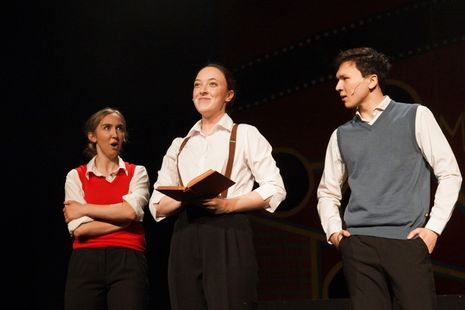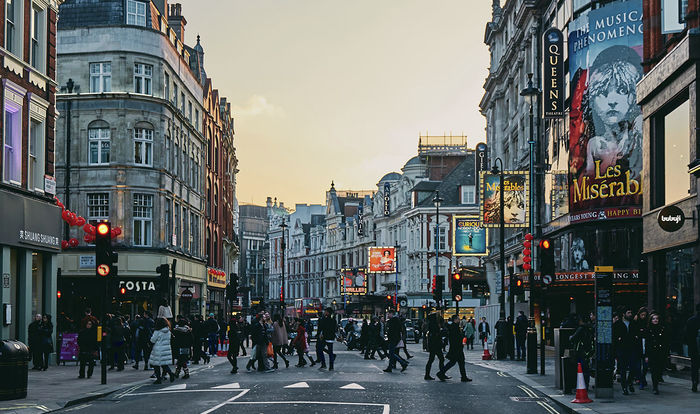Cambridge behind the curtain: Varsity meets CUADC, Footlights, and Marlowe Society presidents
Gina Stock sits down with student theatre society presidents to gain insight into their outlook on theatre, their experiences as president and their advice for budding thesps

Being Footlights, CUADC, and Marlowe society presidents respectively is a huge undertaking for some of the most experienced people within the Cambridge theatre community. For Ayush Prasad, Jonathan Black, and Thea Melton, these are roles they've filled for the last year and ones they are about to be succeeded in. Looking back on their tenures, I asked them to share their insights, experiences, favourite moments, and personal achievements, as well as pass on some advice for future student theatre enthusiasts.
Let’s start from the beginning. A running theme in Cambridge theatre is that the gateway to involvement is usually small performance roles; think bar nights, open mics, smokers, small late shows and rehearsed readings. Ayush Prasad, current Footlights president, started with the BME smoker in 2018. He recounts: “The night itself was incredible – a fantastic lineup, a sold-out ADC, and a really supportive crowd. I got way more laughs than I deserved – during my set, a chair fell over backstage and made a bit of a racket, and I just froze and panicked for a few seconds, but somehow that still got a laugh”. Smokers are a wonderful way to try a set in front of a crowd far from sober, and Ayush has gone on to perform in many more.
“[Heroes] really related to my own life experiences living in a working class community of immigrants”
In their time in the ADC crowd, I asked about their most memorable projects which they hold particularly close to their hearts. Thea Melton, co-president of the Marlowe Society, explained: “My favourite project I worked on was Heroes which was written by my amazingly talented friend Chakira. It really related to my own life experiences living in a working-class community of immigrants in London … [it] encouraged diversity and real life authentic stories”. The Marlowe Society supported this piece of new writing by awarding it the Other Prize; Heroes went on to do a London and Edinburgh Fringe run.
Going deeper, I was interested to hear how each of these presidents were drawn to their respective roles. Jonathan explains he was “keen to help shape the Cambridge theatre environment – to ensure it was welcoming and inclusive and to be a strong representative for students”. His particular focus as CUADC president was being a key contact for the freshers’ show, being an experienced and supportive guide is important in shaping fresher experiences of Cambridge theatre. As a fresher who was initially fairly anxious and reserved within the Cambridge theatre community, a support network in one’s first shows is something I know to be significant, and can make or break a person’s future commitment to theatre.
“Representation has improved in some respects over this time, but there is still a lot more to be done”
Meanwhile Thea explains she “wanted to be president with Cassia as we both wanted to widen participation and make it more accessible especially to marginalised groups”. The Marlowe Society runs a showcase in London for graduating students every Michaelmas, inviting agents and creating showreels, and Thea’s commitment to accessibility meant this year they were able to scrap the participation fee. Similarly, CUADC was able to introduce the Edinburgh Fringe Accommodation Bursary, improving accessibility for students otherwise unable to participate in the Fringe festival.
The role of president for such prominent societies is bound to change one’s perspective of Cambridge theatre. Ayush explains that being primarily a performer means neglecting to consider the technical team behind each show, however as president, he has “a lot more appreciation for directors, producers, management and especially technicians and backstage crew”. Jonathan agrees, elaborating: “The overwhelming takeaway is that I have appreciated the enormous wealth of talent and creativity in Cambridge theatre.”
Cambridge theatre itself has also undergone changes in the past few years, mostly positive, as Thea reflects on the return after Covid and the increased focus on wellbeing, safety and accessibility, and efforts to make student theatre a safe space for everyone who wants to get involved. Ayush, however, gives the key reminder: “Representation has improved in some respects over this time, but there is still a lot more to be done and we can’t pat ourselves on the back just yet”. Cambridge theatre has undergone many changes to improve representation and accessibility, with the ADC publishing statistics about successful pitches and their representation – but it remains true that Cambridge theatre still reflects the structural underrepresentation across theatres in the UK.
Finally, I asked for their golden advice each president would give to new participants in student theatre. Four key themes emerged. Don’t overstretch – Ayush advises: “It’s better to do one show really well than do four shows running on fumes”. Don’t let the competition get to you, as Thea explains: “It can be incredibly competitive and fast paced […] the right roles will find you eventually”. Appreciate each other and be kind, especially to your tech team because if a stage manager drops out, the show can’t happen! And lastly, have an open mind: try out new roles such as tech, directing, producing, performing because there is so much on offer.
So, what to take away from some of our most experienced representatives of Cambridge theatre? Undoubtedly the importance of a president role is being an approachable, friendly and supportive point of contact, and their joint continual commitment to accessibility and representation in theatre is something to be passed on.
 News / Caius mourns its tree-mendous loss23 December 2025
News / Caius mourns its tree-mendous loss23 December 2025 News / Clare Hall spent over £500k opposing busway 24 December 2025
News / Clare Hall spent over £500k opposing busway 24 December 2025 Comment / The ‘class’ of Cambridge24 December 2025
Comment / The ‘class’ of Cambridge24 December 2025 Comment / Yes, I’m brown – but I have more important things to say22 December 2025
Comment / Yes, I’m brown – but I have more important things to say22 December 2025 Interviews / Politics, your own way: Tilly Middlehurst on speaking out21 December 2025
Interviews / Politics, your own way: Tilly Middlehurst on speaking out21 December 2025








